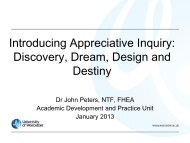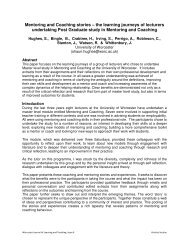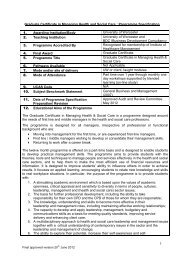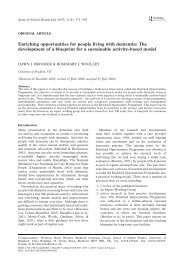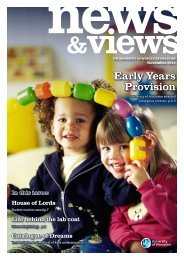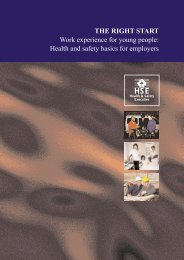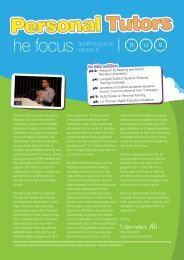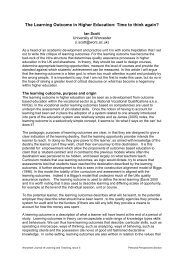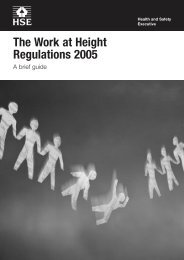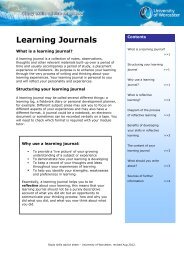Policy and Principles for Accreditation of Prior Learning
Policy and Principles for Accreditation of Prior Learning
Policy and Principles for Accreditation of Prior Learning
You also want an ePaper? Increase the reach of your titles
YUMPU automatically turns print PDFs into web optimized ePapers that Google loves.
Academic Regulations <strong>and</strong> Procedures: <strong>Policy</strong> <strong>and</strong> <strong>Principles</strong> <strong>for</strong> <strong>Accreditation</strong> <strong>of</strong> <strong>Prior</strong> <strong>Learning</strong><br />
<strong>Policy</strong> <strong>and</strong> <strong>Principles</strong> <strong>for</strong> <strong>Accreditation</strong> <strong>of</strong> <strong>Prior</strong> <strong>Learning</strong><br />
Introduction<br />
Following the publication <strong>of</strong> the Quality Assurance Agency (QAA) Guidelines on<br />
<strong>Accreditation</strong> <strong>of</strong> <strong>Prior</strong> <strong>Learning</strong> (September, 2004), a review <strong>of</strong> the current Undergraduate<br />
<strong>and</strong> Taught Postgraduate regulations was undertaken. As part <strong>of</strong> this review it was decided<br />
to produce a single framework <strong>for</strong> accreditation <strong>of</strong> prior learning across the University. The<br />
Framework acknowledges that the uses <strong>of</strong> accreditation <strong>of</strong> prior learning vary between<br />
Departments <strong>and</strong> that the needs <strong>of</strong> the Departmental programmes <strong>and</strong> the student body<br />
may differ accordingly. Although it is desirable that there should be flexibility within the<br />
Framework, it is also essential that procedures be documented.<br />
The University recognises the value <strong>of</strong> learning wherever it occurs, either to meet<br />
programme entry requirements or to achieve credit towards specific awards. However,<br />
accreditation <strong>of</strong> prior learning will only be possible where learning, appropriate to the<br />
outcomes <strong>of</strong> the relevant entry requirements, module(s) or award level, can be assured to<br />
be academically valid.<br />
Definitions<br />
The following definitions are adapted from the QAA Guidelines on <strong>Accreditation</strong> <strong>of</strong> <strong>Prior</strong><br />
<strong>Learning</strong>.<br />
<strong>Accreditation</strong> <strong>of</strong> <strong>Prior</strong> <strong>Learning</strong> (APL): a process <strong>for</strong> accessing <strong>and</strong>, as appropriate,<br />
recognising prior experiential learning or prior certificated learning <strong>for</strong> academic purposes.<br />
This recognition may give the learning a credit-value in a credit-based structure <strong>and</strong> allow it<br />
to be counted towards the completion <strong>of</strong> a programme <strong>of</strong> study <strong>and</strong> the award(s) or<br />
qualifications associated with it. APL is used to encapsulate the range <strong>of</strong> activities <strong>and</strong><br />
approaches used <strong>for</strong>mally to acknowledge <strong>and</strong> establish publicly that some reasonably<br />
substantial <strong>and</strong> significant element <strong>of</strong> learning has taken place.<br />
<strong>Accreditation</strong> <strong>of</strong> <strong>Prior</strong> Certificated <strong>Learning</strong> (APCL): a process through which previously<br />
assessed <strong>and</strong> certificated learning is considered, <strong>and</strong> if appropriate, recognised <strong>for</strong> academic<br />
purposes.<br />
<strong>Accreditation</strong> <strong>of</strong> <strong>Prior</strong> Experiential <strong>Learning</strong> (APEL): a process through which learning<br />
achieved outside education or training systems is assessed <strong>and</strong>, if appropriate, recognised<br />
<strong>for</strong> academic purposes. It is recognised that the process <strong>of</strong> APEL is more resource intensive<br />
than that <strong>for</strong> APCL. APEL will usually involve an applicant consulting an adviser on the<br />
production <strong>and</strong> submission <strong>of</strong> an APEL claim <strong>and</strong> building up a portfolio <strong>of</strong> evidence. An<br />
assessor, the member <strong>of</strong> staff who will exercise academic judgement in assessing an APEL<br />
claim, will then consider the portfolio.<br />
<strong>Prior</strong> learning which may be capable <strong>of</strong> assessment <strong>and</strong> accreditation may have been gained<br />
in a number <strong>of</strong> ways, including paid or unpaid work, as a result <strong>of</strong> courses attended in<br />
1
Academic Regulations <strong>and</strong> Procedures: <strong>Policy</strong> <strong>and</strong> <strong>Principles</strong> <strong>for</strong> <strong>Accreditation</strong> <strong>of</strong> <strong>Prior</strong> <strong>Learning</strong><br />
educational establishments or at work, through self-directed study or through leisure<br />
pursuits<br />
Recognition <strong>of</strong> <strong>Prior</strong> <strong>Learning</strong> (RPL): a process that acknowledges <strong>and</strong> establishes publicly<br />
that some reasonably substantial <strong>and</strong> significant element <strong>of</strong> learning has taken place <strong>and</strong> can<br />
be assessed to have done so. In the context <strong>of</strong> the University, RPL will be used <strong>for</strong> entry to a<br />
course, <strong>and</strong> will be guided by the APL procedures. This is distinct from the procedures<br />
relating to the admission <strong>of</strong> students who do not meet the usual entry requirements<br />
specified <strong>for</strong> a course, which are guided by st<strong>and</strong>ard admissions procedures.<br />
2
Academic Regulations <strong>and</strong> Procedures: <strong>Policy</strong> <strong>and</strong> <strong>Principles</strong> <strong>for</strong> <strong>Accreditation</strong> <strong>of</strong> <strong>Prior</strong> <strong>Learning</strong><br />
<strong>Principles</strong><br />
1. Credit is given <strong>for</strong> learning, <strong>and</strong> not <strong>for</strong> experience alone, <strong>and</strong> where the level, st<strong>and</strong>ard<br />
<strong>and</strong> content are relevant to the particular course. The award <strong>of</strong> credit is a matter <strong>of</strong><br />
consistent application <strong>of</strong> academic judgement, <strong>and</strong> must result from a transparent <strong>and</strong><br />
demonstrably rigorous <strong>and</strong> fair decision making process.<br />
2. Credit will not normally be given <strong>for</strong> learning that has taken place more than six years<br />
previously, <strong>and</strong> will be allocated according to Table 1 below. Credit can only be given <strong>for</strong><br />
whole modules <strong>and</strong> no more than one third <strong>of</strong> credit awarded should be experiential.<br />
Credit may not be counted twice <strong>for</strong> the same award level.<br />
Table 1<br />
Award<br />
Credit<br />
required <strong>for</strong><br />
award<br />
Maximum<br />
credit allowed<br />
NQF Level<br />
Certificate <strong>of</strong> Higher<br />
120 60 4<br />
Education<br />
Higher National Certificate 150 75 4/5<br />
Diploma <strong>of</strong> Higher Education 240 120 4/5<br />
Higher National Diploma 240 120 4/5<br />
Foundation Degree 240 120 4/5<br />
Degree 300 240 4/5<br />
Degree with Honours 360 240* 4/5/6<br />
Postgraduate Certificate 60 (M) 30(M) 7<br />
Postgraduate Diploma 120 (M) 60 (M) 7<br />
Master’s Degree 180 (M) 120 (M) 7<br />
*Students who have gained level 6 credits on pr<strong>of</strong>essionally recognized, m<strong>and</strong>atory awards<br />
(such as NMC approved mentorship programmes), or students who are required, as a<br />
pr<strong>of</strong>essional requirement, to undertake level 6 study outside <strong>of</strong> UW, where UW does not run<br />
the required module <strong>of</strong> study, may be awarded additional credits to those identified above<br />
<strong>for</strong> Honours Degree programmes up to a maximum <strong>of</strong> 40 credits. More in<strong>for</strong>mation on the<br />
National Qualification Levels can be found in the Undergraduate Regulatory Framework.<br />
3. APL that has been accredited by the University will be clearly identified on students’<br />
transcripts.<br />
4. All credit awarded will be relevant to identified modules or awards. <strong>Accreditation</strong> <strong>for</strong><br />
non-specific ‘free’ modules is allowed, where equitable. Detailed assessment <strong>of</strong> credit<br />
whether based on certificated or experiential learning, can only be made by subject<br />
specialists since the assessment can only be made in the light <strong>of</strong> detailed subject<br />
knowledge. These specialists should ensure that the experience represents the<br />
achievement <strong>of</strong> learning outcomes comparable to those which would have been<br />
achieved had the course <strong>of</strong> study against which credit is claimed been taken. This may<br />
be assessed by any method appropriate to what is being assessed, <strong>and</strong> should be<br />
verified by another specialist.<br />
5. It is the responsibility <strong>of</strong> the student to prepare an application <strong>and</strong> submit adequate<br />
documentation. Applicants should identify in advance whether they wish to apply <strong>for</strong><br />
3
Academic Regulations <strong>and</strong> Procedures: <strong>Policy</strong> <strong>and</strong> <strong>Principles</strong> <strong>for</strong> <strong>Accreditation</strong> <strong>of</strong> <strong>Prior</strong> <strong>Learning</strong><br />
admission to a course or credit. Guidance <strong>and</strong> counselling may be sought from the<br />
University, where appropriate.<br />
6. The role <strong>of</strong> the adviser, the member <strong>of</strong> staff who advises a student on the production<br />
<strong>and</strong> submission <strong>of</strong> an APEL claim, must be separate <strong>and</strong> distinct from the role <strong>of</strong><br />
assessor, the member <strong>of</strong> staff who exercises academic judgement in assessing the claim.<br />
In order to maintain the objectivity <strong>and</strong> rigour <strong>of</strong> the APEL Portfolio assessments, the<br />
assessor(s) should be subject specialists able to evaluate the evidence <strong>of</strong>fered <strong>and</strong> to<br />
establish the authenticity <strong>of</strong> the claim. All staff associated with the support, guidance<br />
<strong>and</strong> assessment <strong>of</strong> claims <strong>for</strong> the accreditation <strong>of</strong> prior learning will be expected to<br />
undertake appropriate training.<br />
7. Students should be fully in<strong>for</strong>med by the adviser <strong>of</strong> the range <strong>of</strong> evidence that would be<br />
considered appropriate in a submission. The portfolio <strong>of</strong> academic/pr<strong>of</strong>essional<br />
evidence presented should be appropriate to the proposed programme, sufficient in<br />
length, depth <strong>and</strong> level, authentic <strong>and</strong> recent. Evidence should be included <strong>of</strong><br />
underpinning knowledge. Where a submission <strong>of</strong> learning from experience has<br />
demonstrated learning equivalent to that <strong>of</strong> an existing course unit the credits <strong>and</strong> level<br />
allocated <strong>for</strong> the submission will be the same. C<strong>and</strong>idates may be <strong>of</strong>fered the<br />
opportunity to complete an independent learning module based on their past<br />
experience. This module may, where appropriate, be included in the credit requirement<br />
<strong>for</strong> the award, <strong>and</strong> may be graded <strong>and</strong> count towards the classification <strong>of</strong> the award.<br />
8. Credit awarded through APCL will count towards the attainment <strong>of</strong> the award, but will<br />
not count towards the classification <strong>of</strong> the award.<br />
9. Students may pass some modules without having obtained all the learning outcomes<br />
associated with it. Students seeking APL should be awarded credit <strong>for</strong> modules on a<br />
comparable basis.<br />
10. The Head <strong>of</strong> Registry Services will be responsible <strong>for</strong> co-ordinating the APL application<br />
process. Heads <strong>of</strong> Department are responsible <strong>for</strong> ensuring that University staff are<br />
equipped to provide appropriate in<strong>for</strong>mation <strong>for</strong> students making enquiries about APL.<br />
11. The University will charge an appropriate fee <strong>for</strong> the processing <strong>of</strong> APL claims.<br />
Applicants will be advised whether a fee will be charged. Fees <strong>for</strong> APL claims are<br />
reviewed annually, <strong>and</strong> current charges can be found on the University website.<br />
4
Academic Regulations <strong>and</strong> Procedures: <strong>Policy</strong> <strong>and</strong> <strong>Principles</strong> <strong>for</strong> <strong>Accreditation</strong> <strong>of</strong> <strong>Prior</strong> <strong>Learning</strong><br />
Process<br />
The following process will apply as appropriate:<br />
1. Application<br />
1.1 Applications <strong>for</strong> credit should be routed through the Admissions Office in Registry<br />
Services. Applications <strong>for</strong> full-time undergraduate courses should be made through<br />
UCAS, whilst all other applications will be made directly to the University.<br />
Application <strong>and</strong> APL claim <strong>for</strong>ms will be available on the University website, so that<br />
applicants may download them directly.<br />
2. Advice <strong>and</strong> Guidance<br />
2.1 On initial enquiry, the applicant will be provided with an explanatory leaflet, which<br />
will include advice on the cost <strong>of</strong> applying <strong>for</strong> APL <strong>and</strong> any advice required on<br />
procedure. Applicants will be required to complete a claim <strong>for</strong>m detailing the prior<br />
learning they wish to accredit, <strong>and</strong> to provide appropriate evidence. The Admissions<br />
Office will h<strong>and</strong>le queries at this stage. If more subject detail or advice on evidence<br />
is required, the Admissions Office will consult the relevant Admissions Tutor, who<br />
will appoint an adviser if appropriate. The adviser will:<br />
Advise students on strategies open to them in preparing an APL claim.<br />
Assist students to identify appropriate ways <strong>for</strong>ward.<br />
Begin to help students identify their prior learning<br />
Assist students in completing the appropriate claim <strong>for</strong>m<br />
2.2 The adviser will explore with the student the appropriateness <strong>of</strong> either taking a<br />
preparatory module or submitting a portfolio direct. The advisor will be separate<br />
<strong>and</strong> distinct from the individuals who finally assess that student’s claim (the<br />
assessor).<br />
2.3 Each subject area will identify a named individual or individuals who will provide<br />
advice/guidance about APEL Portfolio construction. Following the submission <strong>of</strong> a<br />
completed claim <strong>for</strong>m, the Admissions Tutor(s) <strong>and</strong> relevant Head <strong>of</strong> Department(s)<br />
will designate an adviser to provide support to an individual student in respect <strong>of</strong><br />
advice <strong>and</strong> guidance concerning a claim <strong>for</strong> APEL Portfolio construction.<br />
3. Submission <strong>of</strong> claim<br />
3.1 Following the submission <strong>of</strong> a completed APL Claim <strong>for</strong>m, the Admissions Office will<br />
advise the prospective student if further evidence <strong>and</strong>/or the appropriate fee is<br />
required. If certification has already been supplied, assessment <strong>of</strong> the claim may<br />
take place at once. If certificates, transcripts <strong>and</strong> references are required the<br />
student will be advised <strong>and</strong>, if necessary, will be given advice on the submission <strong>of</strong><br />
further evidence.<br />
3.2 If additional in<strong>for</strong>mation is required, applicants may be required to provide it to the<br />
Admissions Office. All applications must normally be submitted at least four weeks<br />
be<strong>for</strong>e the student commences the programme <strong>of</strong> study against which credit is<br />
sought. Claims submitted late will not be considered unless the Assistant Registrar<br />
5
Academic Regulations <strong>and</strong> Procedures: <strong>Policy</strong> <strong>and</strong> <strong>Principles</strong> <strong>for</strong> <strong>Accreditation</strong> <strong>of</strong> <strong>Prior</strong> <strong>Learning</strong><br />
(Recruitment & Admissions) is satisfied that the claimant has provided an acceptable<br />
reason <strong>for</strong> late submission.<br />
3.3 The Admissions Office will distribute copies <strong>of</strong> the application <strong>and</strong> supporting<br />
documentation to the appropriate Admissions Tutor together with general guidance<br />
on appropriate credit ratings where this available. The Admissions tutor will<br />
normally be responsible <strong>for</strong> initial assessment <strong>of</strong> APL claims.<br />
3.4 Admissions Tutors will determine the specific academic credit that would, in their<br />
view, be appropriate with regard to their respective course <strong>and</strong> subjects <strong>and</strong> may<br />
request that the student submit additional documentary evidence. Applicants may<br />
be invited <strong>for</strong> a <strong>for</strong>mal interview in support <strong>of</strong> their claim. It is the individual<br />
student’s responsibility to make the claim in respect <strong>of</strong> the number <strong>and</strong> the level <strong>of</strong><br />
credits being sought within the claim <strong>for</strong> APL.<br />
3.6 Admissions Tutors decisions will be co-ordinated <strong>and</strong> recorded by the Admissions<br />
Office, who will advise the applicant <strong>for</strong>mally in writing <strong>of</strong> the decision reached.<br />
4. Assessment <strong>of</strong> documentation<br />
4.1 Applicants may be asked to submit <strong>for</strong> assessment, any or a mixture <strong>of</strong> the<br />
following:<br />
copies <strong>of</strong> transcripts, syllabi, references<br />
a portfolio <strong>of</strong> evidence<br />
attendance at an interview<br />
a simulation or practical exercise<br />
a diagnostic test(s)<br />
a piece <strong>of</strong> work or special assignment<br />
4.2 In order to maintain the objectivity <strong>and</strong> rigour <strong>of</strong> the APEL Portfolio assessments, the<br />
assessor(s) should be subject specialists able to evaluate the evidence <strong>of</strong>fered <strong>and</strong> to<br />
establish the authenticity <strong>of</strong> the claim.<br />
4.3 The Admissions Office <strong>and</strong> Admissions Tutors will use precedents <strong>and</strong> previous<br />
experience <strong>of</strong> students with similar qualifications to determine whether the prior<br />
learning is acceptable. If further advice is needed, Course/Module Leaders or, if<br />
appropriate, the relevant Scheme Director may be consulted. Staff who have acted<br />
as advisers may be asked <strong>for</strong> their recommendation, but the decision about the<br />
amount <strong>of</strong> credit (if any) to be awarded will be taken by an assessor.<br />
4.4 In assessing the documentation, the Admissions Tutor should take into account the<br />
level, st<strong>and</strong>ard, content, relevance <strong>and</strong> recency <strong>of</strong> the prior learning.<br />
4.5 Where appropriate, a second assessment <strong>of</strong> the credit awarded may be undertaken<br />
by a suitably qualified assessor. This will always be considered appropriate where<br />
APEL is claimed, or where claims are based on non-st<strong>and</strong>ard APCL.<br />
6
Academic Regulations <strong>and</strong> Procedures: <strong>Policy</strong> <strong>and</strong> <strong>Principles</strong> <strong>for</strong> <strong>Accreditation</strong> <strong>of</strong> <strong>Prior</strong> <strong>Learning</strong><br />
4.6 Normally, claims will receive a response within six weeks <strong>of</strong> the lodging <strong>of</strong> the<br />
application.<br />
5. Decision-making<br />
5.1 In most instances, Admissions Tutors are the best judges <strong>of</strong> whether prior learning is<br />
<strong>of</strong> a suitable type <strong>and</strong> st<strong>and</strong>ard <strong>for</strong> entry to a programme at this level. Students may<br />
be required to attend <strong>for</strong> interview to assist the decision making process.<br />
5.2 The criteria to be used in judging a claim <strong>for</strong> the accreditation <strong>of</strong> prior learning<br />
should be made explicit to applicants, academic staff, stakeholders <strong>and</strong> assessors<br />
<strong>and</strong> examiners.<br />
5.3 Assessors <strong>of</strong> the documentation should objectively assess portfolio claims using the<br />
following checklist:<br />
6. Monitoring<br />
Validity – That the assessment does identify the knowledge <strong>and</strong> skills it purports<br />
to assess.<br />
Reliability – That the assessment can be repeated with the same outcome.<br />
Sufficiency – That the evidence provided is appropriate in terms <strong>of</strong> quality <strong>and</strong><br />
quantity.<br />
Authenticity - That it is the applicant’s own experience <strong>and</strong> subsequent learning<br />
<strong>for</strong> which accreditation is being sought.<br />
Relevance – That the learning to be accredited represents up to date knowledge<br />
<strong>and</strong> skills.<br />
6.1 The assessment <strong>of</strong> learning derived from experience should be open to internal <strong>and</strong><br />
external scrutiny <strong>and</strong> monitoring within institutional quality assurance procedures<br />
<strong>for</strong> moderation <strong>of</strong> assessment. All APEL claims should be internally moderated <strong>and</strong> a<br />
sample presented <strong>for</strong> external examination.<br />
6.2 It is important that Departments monitor the progress <strong>of</strong> students admitted with<br />
APL, so that in<strong>for</strong>mation is built up on the suitability <strong>of</strong> particular qualifications or<br />
patterns <strong>of</strong> experience <strong>for</strong> the granting <strong>of</strong> advanced st<strong>and</strong>ing or credit exemption.<br />
Relevant in<strong>for</strong>mation should be included in the Annual Monitoring Report<br />
6.3 The Admissions Office will present an annual report to the June meeting <strong>of</strong> the<br />
Academic Quality <strong>and</strong> St<strong>and</strong>ards Committee. This report should cover the number<br />
<strong>of</strong> APL claims submitted <strong>and</strong> accepted by any course, <strong>and</strong> any issues relating to the<br />
principles, process or procedure.<br />
Date document was approved <strong>and</strong> comes into effect: 1 st September 2007<br />
Author <strong>of</strong> the document: Francesca Fairhurst<br />
Date document is due <strong>for</strong> review: September 2009<br />
7
Academic Regulations <strong>and</strong> Procedures: <strong>Policy</strong> <strong>and</strong> <strong>Principles</strong> <strong>for</strong> <strong>Accreditation</strong> <strong>of</strong> <strong>Prior</strong> <strong>Learning</strong><br />
Revision History<br />
Committee Date Change<br />
AQSC 2007 Revised policy approved<br />
8



